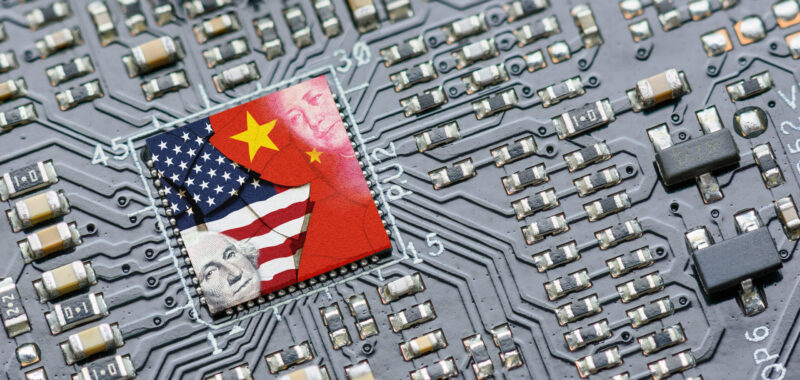AI stocks lost momentum Monday as key geopolitical risk factors were put in the spotlight.
Artificial intelligence (AI) stocks slid Monday due to geopolitical risk factors. Intel‘s (INTC -2.00%), Broadcom‘s (AVGO -4.05%), and Arm‘s (ARM -4.96%) share prices ended the daily session down 2%, 4.1%, and 5%, respectively, according to data from S&P Global Market Intelligence. Meanwhile, Nvidia ended the day down 2.3%, and Micron fell 3.8%.
Semiconductor investors were hit with bearish news on multiple geopolitical fronts today. China is circumventing AI technology restrictions imposed by the U.S., but that was hardly the most surprising story of the day.
A Chinese military plane breached Japanese airspace this morning — an unprecedented encroachment that followed multiple incidents involving Chinese aircraft in the Philippines that raised concerns. Adding another source of geopolitical uncertainty, Poland said that it believed that a Russian aircraft had entered its airspace.
Geopolitical risk took center stage Monday
Aiming to halt the technological advancement of its chief geopolitical rival, the U.S. has introduced restrictions to prevent advanced chips and semiconductor-manufacturing equipment being sold to China. But The Wall Street Journal published a report this morning stating that China has been using third-party AI processing services to get around these export bans.

Image source: Getty Images.
Leadership in the artificial intelligence space has become a key economic and national security priority for both the U.S. and China. The pursuit of supremacy in the space could push tensions between the rivals even higher.
Recent news of Chinese encroachments in Japan and the Philippines raise some immediate territorial concerns, but the greater specter being highlighted for investors is the possibility that China could invade Taiwan at some point in the not-too-distant future. While many companies are designing their own artificial intelligence chips and processors, Taiwan Semiconductor Manufacturing is currently responsible for the fabrication of roughly 80% of the semiconductors used for advanced AI applications. If TSMC’s chip production were to be disrupted or seized, the impact on supply chains and the broader global economy would likely be calamitous. It could also be the inciting incident for the spread of a wider conflict.
In addition to China-related developments, investors had other geopolitical risk factors to consider. Poland reported that a Russian aircraft had entered into its airspace on the way to Ukraine, raising concerns that conflict could escalate in the region. News also surfaced that a security scare at a NATO military base in Germany last week had been triggered by an intelligence service’s report that Russia may have been preparing to sabotage the base using drones.
What’s next for Intel, Broadcom, Arm, and other AI chip stocks?
China news has been a recurring bearish catalyst for chip stocks over the last year, and there’s a good chance that geopolitical risk will continue to be one of the primary drivers of near-term volatility. In particular, companies that rely heavily on TSMC for chip fabrication could see outsized bearish moves if the perceived likelihood of conflict in Asia increases. This dynamic could explain why Intel saw a smaller pullback than Broadcom, Arm, and other AI stocks today.
Even though Intel uses TSMC to manufacture some of its most advanced chips, it has substantial fabrication resources of its own. Intel is currently the world’s third-largest fabricator of chips, trailing behind only the Taiwan-based market leader and Samsung. With concerns that China may invade Taiwan increasing, the U.S.-based company is investing heavily to improve its fabrication capabilities and position itself as an alternative to TSMC. But even Intel would be unlikely to escape more big sell-offs if China moved to gain control of Taiwan and TSMC.
However, while geopolitical risk factors will continue to factor into valuations for semiconductor companies and other AI players, the next big market-moving catalyst is likely much closer on the horizon. Nvidia is scheduled to release its second-quarter earnings results after the market closes on Wednesday, which is positioned to be one of 2024’s most influential financial reports.
Nvidia’s business performance and stock moves have frequently impacted trading for other AI stocks this year, and there’s a good chance that the company’s upcoming earnings report will have ripple effects for other artificial intelligence players. If the AI leader’s quarterly results and forward guidance manage to exceed Wall Street’s expectations, other artificial intelligence stocks could enjoy significant valuation boosts. But expectations are running high heading into the report, and even the smallest of shortfalls could spur substantial volatility.
Keith Noonan has positions in Micron Technology. The Motley Fool has positions in and recommends Nvidia and Taiwan Semiconductor Manufacturing. The Motley Fool recommends Broadcom and Intel and recommends the following options: short November 2024 $24 calls on Intel. The Motley Fool has a disclosure policy.

